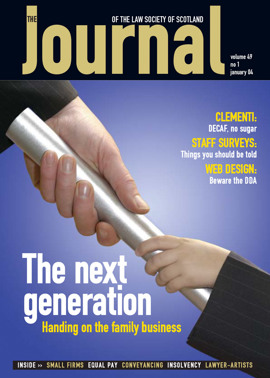Wake up to disability
Those of us who specialise in licensing work are occasionally accused of taking a soft option. There are only a couple of statues, we are told, and not much material to command. One can answer this on two levels. First, as any regular attendee at licensing boards will tell you, there are many traps for the unwary. Dabblers beware. More fundamentally, to give proper proactive advice to those in the licensed trade, one must have a proper knowledge and understanding of the many areas of regulation to which the trade is subjected.
It is slowly beginning to dawn on the licensed trade that within a matter of months Part III of the Disability Discrimination Act 1995 comes into force. The Act is well known by now to employment lawyers, the relevant parts having been in force since 1996. It is probably not all that well known that since 1 October 1999 service providers have had to make “reasonable adjustments” for disabled people, such as providing extra help or making changes to the way they provide their services. By now, all licensees should have assessed the way they do business, and issued clear instructions to staff on how to deal with disabled customers. My experience suggests that very few are even aware of the legal position, never mind having taken any steps to comply.
Many have no idea of the concept of “disability”. Most think of people in wheelchairs. In fact, a DSS Research Report, Disability in Great Britain published in 1999, identifies 8.6 million people with a disability in England, Wales and Scotland, approximately one in seven of the population. As well as physical/mobility impairment, the legislation applies to those with almost any substantial, adverse and long term impairment. Sight and hearing difficulties must be catered for, and allowance must be made for mental ill health or even learning disabilities, traits which may be very difficult to detect. The Disability Rights Commission estimates the annual spending power of this group around the £50 billion mark. One may wonder whether the calculation was carried out with the same accuracy as reports on weapons of mass destruction, but there is no doubt that there is a huge potential problem.
What will really focus the problem are the changes which will become effective on 1 October 2004. From that date service providers may have to make “reasonable adjustments” in relation to the physical features of their premises to overcome physical barriers to access. This may involve altering or removing a physical feature, providing a reasonable means of avoiding it, or providing a reasonable alternative method of making services available. What is reasonable is a matter of fact and degree, but simply doing nothing without having carried out an access audit, or taken advice, will not be good enough. The publicity which will ensue will also highlight those parts of the Act already in force prohibiting disabled people being treated less favourably.
Numerous questions pose themselves for the licensed trade. How does a disabled person get into your premises? If they cannot open the door unaided how do they attract your attention to let them in? Do your staff know what to do? How do you deal with a deaf person? What if someone cannot read your normal menu? Do you have any bedrooms which can be accessed by a wheelchair user? Do you have alternative means of access avoiding stairs, or do you need to erect ramps? Will there be enough room in your car park for a disabled person to get out of her vehicle? I could fill the rest of this column with questions, but you get the point.
The good news is that the duties are not absolute. Guidelines issued by the Disability Rights Commission suggest that common sense should prevail. Although the courts will provide the ultimate test, it is likely that DRC guidelines will carry much weight. Further good news for the trade is that drunk or alcoholic customers are not “disabled” for the purposes of the Act. The size of the business will be relevant in assessing what is reasonable. Steps necessary in a 40 bedroom hotel may not be justifiable in a four bedroom guest house.
The licensed trade is clearly in need of expert advice, urgently. It is up to us as a profession to seize the opportunity.
Tom Johnston, Young & Partners, DunfermlineIn this issue
- Wanted: debaters, and reporters
- Small firms: tackling the profit problem
- Who is the family business client?
- Winning your service game
- A near-death experience
- Managing those tensions
- Full strength DECAF
- What should the new Sentencing Commission do?
- A brush with the law
- The truth and the whole truth
- See, hear, speak no html
- Looking back, going forward
- Inhibition on the dependence lives on
- Framework for debt payment takes shape
- Wake up to disability
- Mind the gap
- The new dance called "Electricity"
- Website reviews
- Book reviews
- Conveyancing - not much change in 400 years
- Ironing out settlements and SDLT
- The new law of real burdens
- Housing Improvement Task Force
- Opening the query lines






